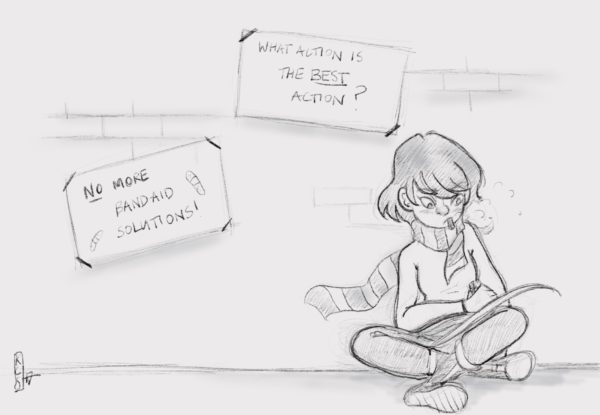The afternoon of Nov. 2, I was walking to class when I overheard a conversation between two individuals. They, like everyone else on campus that day, were discussing the vandalism of the fraternity houses.
“I’m so glad someone is finally doing something,” one of them said. The other nodded in agreement.
Those words stayed with me, and even now I cannot seem to get them out of my head. Unfortunately, it is no secret that sexual assault is an issue at the College of William and Mary. According to the 2014 Campus Climate Survey, one in five women and one in sixteen men had been sexually assaulted during their time as a student.
These statistics are both extremely devastating and alarming. Clearly something needs to change; clearly something needs to be done. For many, the individual who spray painted the words “rape” and “rapists” on fraternity housing did what should have been done a long time ago. They stood up to a misogynistic institution that is not held responsible for its actions by calling out fraternity men for what they are: rapists. Finally, someone did something to fight sexual assault. Right?
No. We need to stop acting as if spray painting words on a building is somehow brave or helpful or fights for victims of sexual assault. If anything, this incident has done nothing but damage our community. While yes, it has started a conversation regarding sexual assault here at the College, it has not been a productive conversation. The way to engage men of fraternities about the importance of consent is not by calling them all rapists. By doing so, the importance of the message is muffled by anger and defensiveness.
A truly successful way to fight sexual assault does not have the potential to harm survivors.
By calling all fraternity members rapists, the vandal(s) and those who defended them excuse the few who are actually perpetrators. Their generalizations allow those actually guilty of assault to fade into the crowd of the accused, in this case the entire IFC community. Perpetrators need to be held responsible for their actions, but, by issuing a blanket indictment of all fraternity members, the actions of the truly guilty are minimized.
Statistically, there could potentially be dozens of survivors of sexual assault living in the fraternity houses; dozens of survivors who had to wake up to the word “rape” spray painted on their homes. This vandalism that was supposedly done in support of survivors had the potential to trigger and upset not only the survivors who live in the fraternity houses, but also the survivors who, without warning, saw those words on their way to class or work. A truly successful way to fight sexual assault does not have the potential to harm survivors.
All this being said, I know it may be easy to want to support the vandalism because it feels like someone is taking action against sexual assault. In reality, the vandalism has done nothing substantial other than anger and divide the community. The vandal(s) are not fighting to end sexual assault or help survivors. The people who volunteer at The Haven are. The members of HOPE and Someone You Know are. National organizations like End Rape on Campus and Futures Without Violence are. These are people who are actually working to end sexual assault and help survivors, not make headlines. These are the people and organizations we should be supporting, donating to, and joining.
While I wish that the vandalism had never occurred, we do have an opportunity to redeem the situation. Let’s use this as a way to start a real conversation about how we can all help end sexual assault here at the College. Not one based in anger or accusations, but one based in a desire to help our community. Let’s work harder to educate on issues like consent and bystander awareness, and let’s work harder to support our community’s survivors. Sexual assault is a real and pressing issue; let’s start doing something about it.
Email Katherine Yenzer at keyenzer@email.wm.edu.


Thank God there is finally a sane take on this. I think it is especially important to point out that this actually wasn’t really doing anything to tackle the problem.
I am genuinely confused how you expect people to not respond with “accusations or anger”. The problem of sexual assault is infuriating. There is a reason those who commit sexual assault are called the “accused”. This is a problem with real survivors (not victims), and real perpetrators. Those perpetrators are people, clubs, institutions, etc., and unfortunately the national and William & Mary specific statistics support that fraternities are a real cornerstone of the problem. To call this “vandalism” is incredibly narrow minded, which equates a public condemnation with a misdemeanor offense. You’re right – these actions were an accusation. They were committed out of anger. And they were absolutely justified. Can you truly not think of a time where the law has been bent to stop far more grievous violations?
Frankly, how dare you say the people who did this are not fighting to end sexual assault. You might think this was not justified, but you cannot seriously believe it was done with any other intent than attacking the problem. As for survivors forced to see the words, I concede the experience may have been awful, and if it was, we need to hear about it. That said, nowhere is your story supported with so much as a shred of research. If you want to know how survivors felt about the incident, ask. From my own conversations with several of them, you are way out of touch. If you’re truly looking to support this cause, you have an obligation to let the survivors choose how they want to proceed.
And by the way, this is the opposite of a “Bandaid solution”.